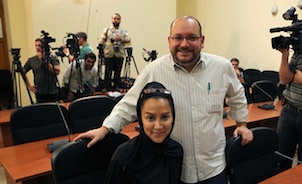
“In Jason’s conviction the judge delivered the will and demand of the intelligence services.” said Hadi Ghaemi, Executive Director of the International Campaign for Human Rights in Iran. “This is politicized justice at its worst,” he added.
On October 11, the Judiciary spokesperson, Mohseni Ejei, told a press conference “Rezaian has been convicted but I don’t know the details of his sentence.” He added the defendant has 20 days to appeal the sentence. The Judiciary has refused to inform the family or Rezaian’s lawyer of any of the details of the ruling, even though the clock is already ticking on the days left to appeal.
The facts of the case reflect the Iranian authorities’ contempt for the Islamic Republic’s own laws guaranteeing freedom of the press and due process.
“The international community must signal its utter rejection of this judicial farce and let Tehran know its pariah status will remain unchanged without the release of Jason Rezaian and the hundreds of other political prisoners in Iran,” said Ghaemi.
Rezaian was arrested and detained for nine months before any charge was announced. He was held in solitary confinement and incommunicado for five months—a tactic common in Iran when the authorities wish to isolate and exert maximum pressure on an individual, preventing the detainee’s access to any information and facilitating their ability to extract “confessions.”
During Rezaian’s year-long imprisonment, authorities repeatedly leaked details of the case to publications close to Iran’s Revolutionary Guards—allegations that were published even though the investigation was still underway. Such leaks are a common tactic used by the authorities in Iran to make their allegations part of the public record, thereby justifying the arrest, forming public opinion, and preempting any possible efforts to challenge these “facts” on the ground.
The prosecution charged him with “spying and cooperation with an enemy government,” “propaganda against the state,” and “acting against national security.”
Among the details fed to the media were false allegations that Rezaian had illegally “infiltrated” the Rouhani administration in order to acquire information for nefarious purposes through Rouhani’s nephew, Esmail Samavi, who directs the president’s Press Division office. These allegations, which suggested Rezaian’s case was part of a broader internal political struggle in Iran, subsequently became the basis for the national security-related charges for which Rezaian was prosecuted and convicted, indicating the pre-ordained nature of the prosecution.
Rezaian was denied access to counsel for months after his arrest. The judge handpicked by the Judiciary to preside over his case, Judge Salavati, is infamous for his harsh sentencing, and rejected at least three independent lawyers introduced by Rezaian’s family to represent him. The journalist was eventually forced to accept a lawyer who was approved by the court.
Sources close to the case also told the Campaign that during his year-long incarceration, Rezaian was threatened with a long prison sentence if he did not to cooperate with his interrogators—which meant signing off on a scenario the authorities prepared and making a false confession.
The trial itself was also a travesty of justice. Rezaian’s lawyer, Leila Ahsan, publicly told ISNA (the Iranian Students News Agency) that she was not given time nor the opportunity to respond to the prosecution’s arguments.
“The Rouhani administration hides behind the ‘independence’ of the Judiciary, but the president is responsible for protecting journalists who are working legally in the country and enforcing a constitution that guarantees due process,” noted Ghaemi. “Rouhani’s unwillingness to address this miscarriage of justice calls into question his stated commitment to ensure Iran is a country ruled by law.”
This case also marks one of the few instances when the wife of a journalist has been effectively held hostage in order to create pressure on a detainee. Rezaian’s wife, Yeganeh Salehi, who worked for the UAE newspaper The National as their Tehran correspondent, was arrested with Rezaian on July 22, 2014, and not released until October 2014.
After her release, Salehi refused to speak publicly on the case, and on the last day of Rezaian’s trial, his mother told a reporter that Salehi had been banned from speaking to the media.
Follow the Campaign on Facebook and Twitter
For the latest human rights developments in Iran visit the Campaign’s website
For interviews, contact:
Hadi Ghaemi at +1-917-669-5996, hadighaemi@iranhumanrights.org
